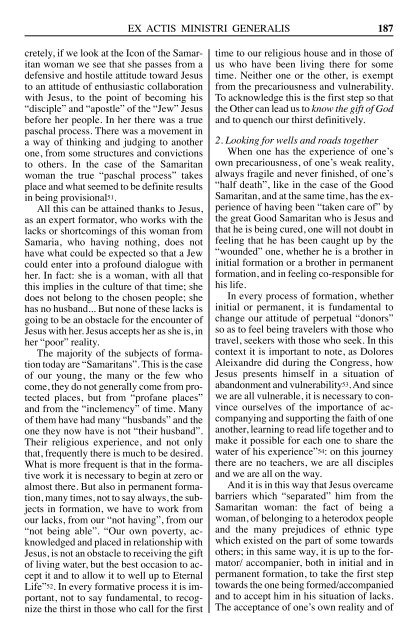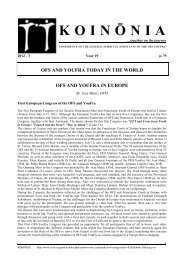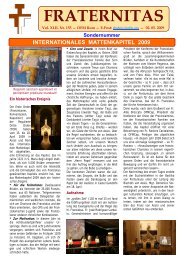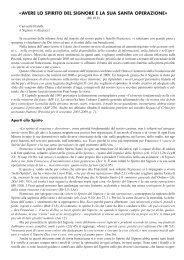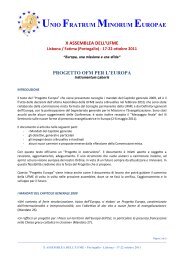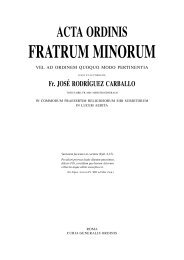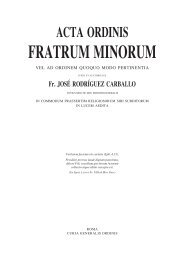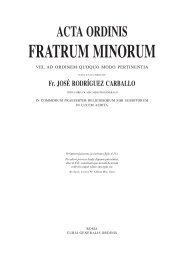You also want an ePaper? Increase the reach of your titles
YUMPU automatically turns print PDFs into web optimized ePapers that Google loves.
EX ACTIS MINISTRI GENERALIS<br />
187<br />
cretely, if we look at the Icon of the Samaritan<br />
woman we see that she passes from a<br />
defensive and hostile attitude toward Jesus<br />
to an attitude of enthusiastic collaboration<br />
with Jesus, to the point of becoming his<br />
“disciple” and “apostle” of the “Jew” Jesus<br />
before her people. In her there was a true<br />
paschal process. There was a movement in<br />
a way of thinking and judging to another<br />
one, from some structures and convictions<br />
to others. In the case of the Samaritan<br />
woman the true “paschal process” takes<br />
place and what seemed to be definite results<br />
in being provisional51.<br />
All this can be attained thanks to Jesus,<br />
as an expert formator, who works with the<br />
lacks or shortcomings of this woman from<br />
Samaria, who having nothing, does not<br />
have what could be expected so that a Jew<br />
could enter into a profound dialogue with<br />
her. In fact: she is a woman, with all that<br />
this implies in the culture of that time; she<br />
does not belong to the chosen people; she<br />
has no husband... But none of these lacks is<br />
going to be an obstacle for the encounter of<br />
Jesus with her. Jesus accepts her as she is, in<br />
her “poor” reality.<br />
The majority of the subjects of formation<br />
today are “Samaritans”. This is the case<br />
of our young, the many or the few who<br />
come, they do not generally come from protected<br />
places, but from “profane places”<br />
and from the “inclemency” of time. Many<br />
of them have had many “husbands” and the<br />
one they now have is not “their husband”.<br />
Their religious experience, and not only<br />
that, frequently there is much to be desired.<br />
What is more frequent is that in the formative<br />
work it is necessary to begin at zero or<br />
almost there. But also in permanent formation,<br />
many times, not to say always, the subjects<br />
in formation, we have to work from<br />
our lacks, from our “not having”, from our<br />
“not being able”. “Our own poverty, acknowledged<br />
and placed in relationship with<br />
Jesus, is not an obstacle to receiving the gift<br />
of living water, but the best occasion to accept<br />
it and to allow it to well up to Eternal<br />
Life”52. In every formative process it is important,<br />
not to say fundamental, to recognize<br />
the thirst in those who call for the first<br />
time to our religious house and in those of<br />
us who have been living there for some<br />
time. Neither one or the other, is exempt<br />
from the precariousness and vulnerability.<br />
To acknowledge this is the first step so that<br />
the Other can lead us to know the gift of God<br />
and to quench our thirst definitively.<br />
2. Looking for wells and roads together<br />
When one has the experience of one’s<br />
own precariousness, of one’s weak reality,<br />
always fragile and never finished, of one’s<br />
“half death”, like in the case of the Good<br />
Samaritan, and at the same time, has the experience<br />
of having been “taken care of” by<br />
the great Good Samaritan who is Jesus and<br />
that he is being cured, one will not doubt in<br />
feeling that he has been caught up by the<br />
“wounded” one, whether he is a brother in<br />
initial formation or a brother in permanent<br />
formation, and in feeling co-responsible for<br />
his life.<br />
In every process of formation, whether<br />
initial or permanent, it is fundamental to<br />
change our attitude of perpetual “donors”<br />
so as to feel being travelers with those who<br />
travel, seekers with those who seek. In this<br />
context it is important to note, as Dolores<br />
Aleixandre did during the Congress, how<br />
Jesus presents himself in a situation of<br />
abandonment and vulnerability53. And since<br />
we are all vulnerable, it is necessary to convince<br />
ourselves of the importance of accompanying<br />
and supporting the faith of one<br />
another, learning to read life together and to<br />
make it possible for each one to share the<br />
water of his experience”54: on this journey<br />
there are no teachers, we are all disciples<br />
and we are all on the way.<br />
And it is in this way that Jesus overcame<br />
barriers which “separated” him from the<br />
Samaritan woman: the fact of being a<br />
woman, of belonging to a heterodox people<br />
and the many prejudices of ethnic type<br />
which existed on the part of some towards<br />
others; in this same way, it is up to the formator/<br />
accompanier, both in initial and in<br />
permanent formation, to take the first step<br />
towards the one being formed/accompanied<br />
and to accept him in his situation of lacks.<br />
The acceptance of one’s own reality and of


